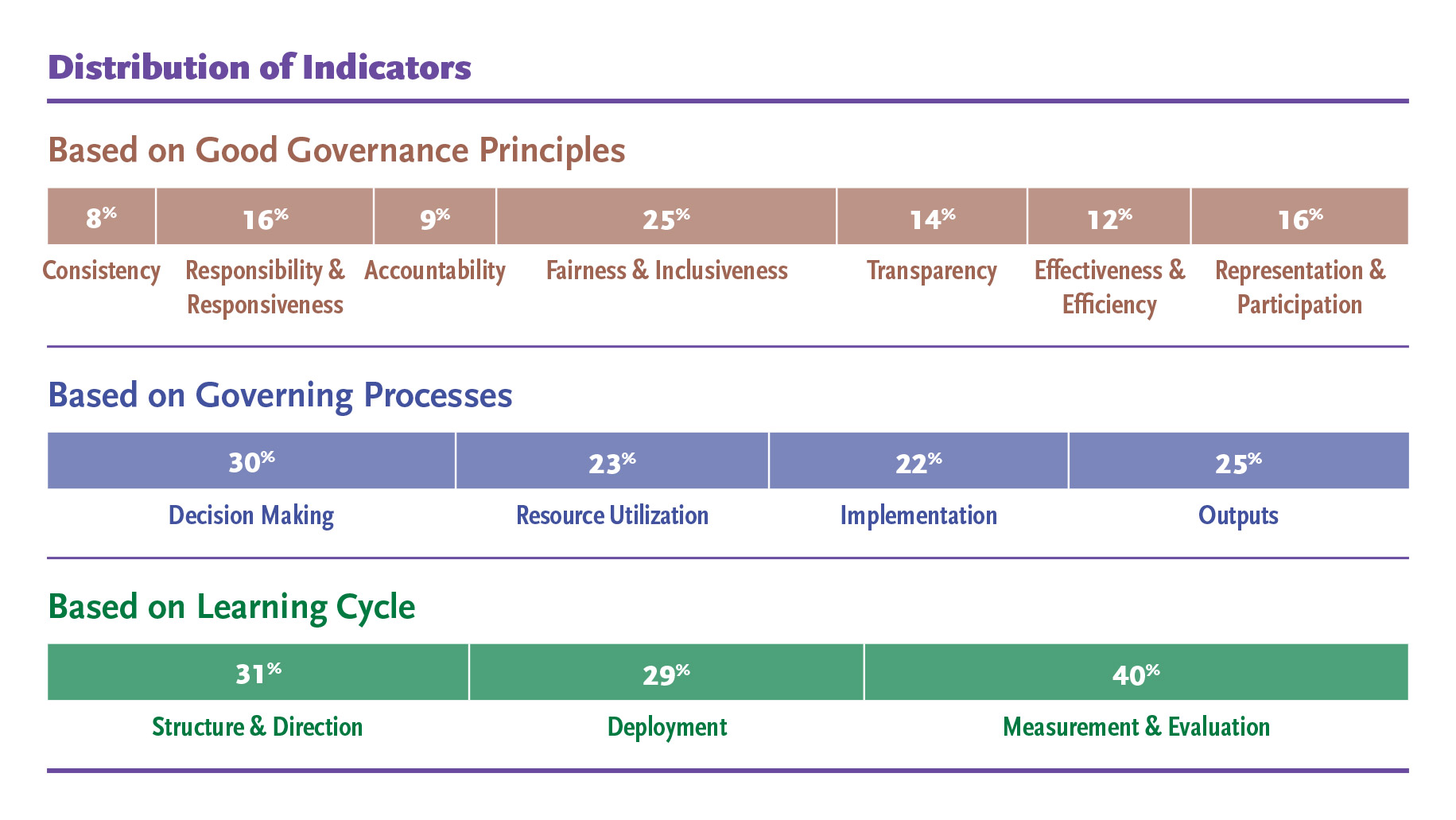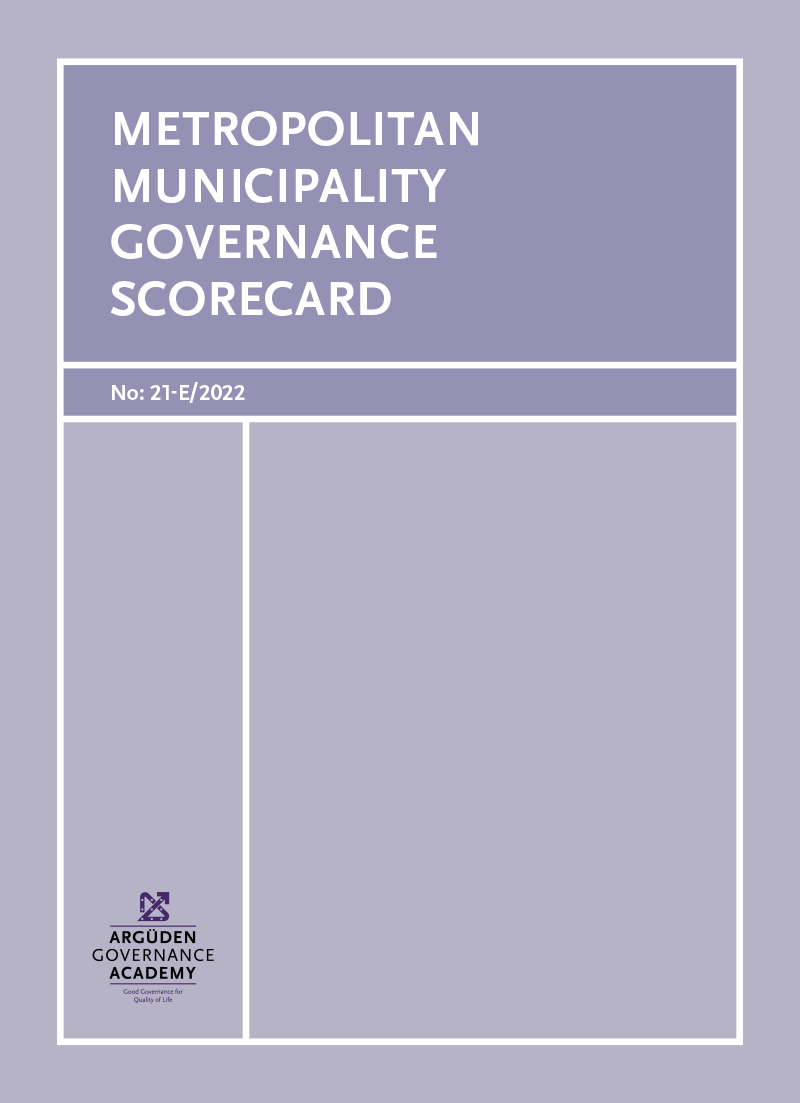Methodology
The Metropolitan Municipality Governance Scorecard (MMGS) project has been implemented to evaluate good governance in metropolitan municipalities based on publicly available documents and data. Practices of good governance principles in Turkish metropolitan municipalities, areas of improvement, and good practices that can foster a mutual learning process have been analyzed. The research focuses not on the municipal performance for service provision or the consequences of municipal policies but on the development of a culture of good governance throughout different processes of local governance. The scope of research is limited to the 27 metropolitan municipalities run by elected mayors.
We define good governance as a multidimensional concept relevant to the quality of procedures of decision-making and implementation. As such, we acknowledge that the principles of good governance can be applied through different procedures and play different roles in institutional learning.
Good governance does not simply mean the application of relevant principles. It is also a part of each process of local governance and learning for metropolitan municipalities.
- Consistency
- Responsibility and Responsiveness
- Accountability
- Fairness and Inclusiveness
- Transparency
- Effectiveness and Efficiency
- Representation and Participation
- Agenda setting/Decision Making
- Resource utilization
- Implementation/Service Provision
- Institutional functioning/capacity
- Structure and direction
- Deployment
- Measurement and evaluation
Research Process and Measuring Good Governance
First, the relevant academic literature and international approaches were analyzed to define good governance. We then identified the duties and responsibilities of Turkish metropolitan municipalities to ensure the validity of research for the case of Türkiye. The legal and political framework, i.e., laws, regulations, and national policy documents, was examined. We assessed the mechanisms and activities in which the principles of good governance could be practiced in Turkish metropolitan municipalities. We further linked our analysis of the laws and regulations for municipalities in Türkiye with the United Nations (UN) Sustainable Development Goals (SDGs) and the OECD Better Life Index (BLI).

Based on this process, we formed 337 indicators. Although this research exclusively covers the case of Türkiye, we aimed at a generalizable research model through the link between our indicators and SDGs and BLI. In other words, while our indicators do not contradict national legislation, we also avoid forming Türkiye-specific indicators to contribute to international research on good governance.
Our research focuses not on the perception and subjective evaluation of good governance but rather, on the objective measurement of it. Therefore, we utilized information and documents in the public domain to collect data as in the following:
- Strategic plans of metropolitan municipalities (for the 2020-2024 period)
- Performance programs of metropolitan municipalities (for 2021 and 2022)
- Annual activity reports of metropolitan municipalities (for 2021)
- Websites of metropolitan municipalities
- News and information available through search engines
We also benefited from other official documents such as the reports of municipal financial situation and expectations, and final accounts if necessary. As such, the quality of reporting affects our findings. The data collected in this way is influenced by the institutions that publish the documents used as data sources. We did not investigate the accuracy or completeness of the reported information. However, information sharing which is based on comprehensible and comparative data increases transparency, strengthens citizens’ capacity to monitor and evaluate municipalities. As such, we consider the quality of data as a requisite for good governance.
Scorecard Methodology
We built 337 indicators that represent 7 good governance principles, 4 governance processes and 3 dimensions of institutional learning. Each indicator is a question that can be answered by citizens and other stakeholders as ‘true/yes’ or ‘false/no’ based on the digital information and documents on metropolitan municipalities. A ‘yes’ answer corresponds to 1 point. Governance scorecards were determined by the sum of weighted scores.

We looked at the strategic plans, performance programs, annual activity reports and websites of the municipalities to answer our questions. After comparative research on pilot municipalities, we revised the indicators if necessary. We built a codebook to ensure reliability and aimed at minimizing the error due to multiple interpretations of the same indicator.
We weighted each indicator based on three dimensions: to which principle of good governance, to which governance process, and to which dimension of institutional learning the indicator corresponds. The weighting process was determined by the conceptual framework of the research and our normative preferences for good governance. While the weights of good governance principles and governance processes are almost the same within each category, evaluation and assessment are outweighed by the structure and direction, and deployment dimensions of institutional learning.
In general, scorecards tell us about the score of a municipality for the extent to which it adopts good governance. Our methodology allows for the evaluation of the overall performance from three different perspectives. While reading the scorecards, it is also possible to see the performance of a municipality for each principle of good governance or for different parts of institutional learning. For instance, municipalities with high scores are not necessarily the best in every good governance principle. Alternatively, we see that a municipality with a relatively low score can perform better in a specific area than do top municipalities in that area. We hope that a closer look at our scorecards, good practices, findings, and recommendations will help us identify areas of development for metropolitan governance and promote a culture of good governance in the future.



